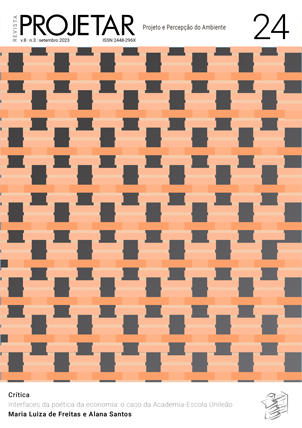Fatores críticos para adoção de habitações sustentáveis
revisão integrativa entre 2018 e 2022
DOI:
https://doi.org/10.21680/2448-296X.2023v8n3ID31853Palavras-chave:
motivadores, barreiras, sustentabilidade, indicadoresResumo
Não há consenso na literatura sobre motivadores e barreiras relacionadas à adoção de moradias sustentáveis. Esta pesquisa tem como objetivo identificar a produção científica mundial sobre desenvolvimento sustentável em habitações do ponto de vista teórico e empírico. Através de uma revisão integrativa da literatura, após identificar a produção científica indexada às bases de dados selecionadas, os principais artigos foram filtrados inicialmente considerando o problema de pesquisa, por meio da leitura dos títulos e resumos, 27 artigos foram analisados pelos seguintes aspectos: bibliométrico, conceitual e categórico. Os resultados mostraram que fatores econômicos, medidas governamentais e o mercado consolidado com profissionais especializados na área são impulsionadores e barreiras para a adoção de moradias sustentáveis. Fatores ambientais e sociais incentivam a prática, porém fatores culturais, falta de conhecimento sobre o assunto e os riscos de desempenho da edificação são negativos. Embora muitos estudos tenham como foco o usuário, a maioria deles foca na intenção de compra, e não na sua adoção por medidas financeiras ou de assistência governamental. Assim, compreender as diferentes percepções de todos os rendimentos permite intervenções específicas para cada um. Além disso, o estudo fornece novos insights sobre a adoção sustentável de habitação e apresenta sugestões para pesquisas futuras.
Downloads
Referências
ADABRE, M. A. et al. Evaluation of symmetries and asymmetries on barriers to sustainable housing in developing countries. Journal of Building Engineering, [s. l.], v. 50, 2022. Disponível em: https://www.scopus.com/inward/record.uri?eid=2-s2.0-85124798161&doi=10.1016%2Fj.jobe.2022.104174&partnerID=40&md5=63826e502040ec838786ab994b9edf33.
ADABRE, M. A.; CHAN, A.t P. C. Modeling the Impact of Barriers on Sustainable Housing in Developing Countries. Journal of Urban Planning and Development, [s. l.], v. 147, n. 1, p. 05020032, 2021. Disponível em: http://ascelibrary.org/doi/ 10.1061/%28ASCE%29UP.1943-5444.0000639.
ADABRE, M. A.; CHAN, A. P. C.; DARKO, A. Interactive effects of institutional, economic, social and environmental barriers on sustainable housing in a developing country. Building and Environment, [s. l.], v. 207, 2022. Disponível em: https://www.scopus.com/inward/record.uri?eid=2-s2.0-85118499417&doi=10.1016%2Fj.buildenv.2021.108487&partnerID=40&md5=93c785a6d78b5b0224566d4c976b1214.
ADEKUNLE, T O; NIKOLOPOULOU, M. Post-occupancy evaluation on people’s perception of comfort, adaptation and seasonal performance of sustainable housing: a case study of three prefabricated structural timber housing developments. Intelligent Buildings International, [s. l.], v. 12, n. 2, p. 71–99, 2020. Disponível em: https://www.scopus.com/inward/record.uri?eid=2-s2.0-85049790786&doi=10.1080%2F17508975.2018.1493677&partnerID=40&md5=3f0b9232a50ef440eb77b93d70455f4d.
AGOPYAN, V.; JOHN, V. M.; GOLDENBERG, J. O desafio da sustentabilidade na construção civil. São Paulo: Blucher, 2011.
AYOADE, O,; AHMED, V. Knowledge influences on perception of innovation drivers for sustainable housing development models. International Journal of Knowledge Management Studies, [s. l.], v. 11, n. 1, p. 1–19, 2020. Disponível em: https://www.scopus.com/inward/record.uri?eid=2-s2.0-85079862988&doi=10.1504%2FIJKMS.2020.105070&partnerID=40&md5=ded6e414fb0b7269d93e44264bd43946.
BOFF, L. Sustentabilidade: o que é - o que não é. 5. ed. Petrópolis: Vozes, 2016.
BRASIL. MINISTÉRIO DO MEIO AMBIENTE. Sustentabilidade urbana: impactos do desenvolvimento econômico e suas conseqüências sobre o processo de urbanização em países emergentes: textos para as discussões da Rio+20: volume 3 habitação social e sustentabilidade. Brasília: MMA, 2015.
BROWN, Z. Greening household Behaviour: Cross-domain Comparisons in Environemental Attitudes and Behaviours Using Spatial EffectsOECD Environment Working Papers. Paris: OECD Publishing, 2014. Disponível em: http://www.oecd-ilibrary.org/docserver/download/5jxrclsj8z7b.pdf?expires=1456824710&id=id&accname=guest&checksum=C6B06F2A3B2A47C306F3477DB86A7121. .
CÂMARA BRASILEIRA DA INDÚSTRIA DA CONSTRUÇÃO (CBIC). Manual do Projeto O Futuro da Minha Cidade. Brasília: Câmara Brasileira da Indústria da Construção (CBIC), 2018.
CHAN, A. P. C. et al. Critical barriers to green building technologies adoption in developing countries: The case of Ghana. Journal of Cleaner Production, [s. l.], v. 172, p. 1067–1079, 2018.
CONFEDERAÇÃO NACIONAL DA INDÚSTRIA (CNI). Construção sustentável: a mudança em curso. Brasília: CNI, 2017. Disponível em: http://www.cbic.org.br/sustentabilidade/wp-content/uploads/sites/22/2017/10/Caderno-Setorial-CBIC-CNI-Sustentabilidade.pdf.
CONSEIL INTERNATIONAL DU BATIMENT (CIB). Agenda 21 for Sustainable Construction in Developing Countries – a discussion document. Pretoria: IB & UNEP-ITEC, 2002.
CONSELHO BRASILEIRO DE CONSTRUÇÃO SUSTENTÁVEL (CBCS). Aspectos da Construção Sustentável no Brasil e Promoção de Políticas Públicas Subsídios para a promoção da Construção Civil Sustentável. [S. l.: s. n.], 2014.
COOPER, J.; LEE, A.; JONES, K. Sustainable built asset management performance indicators and attributes: A UK social housing case study example. International Journal of Building Pathology and Adaptation, [s. l.], v. 38, n. 3, p. 508–522, 2020.
DARKO, A. et al. Drivers for implementing green building technologies: An international survey of experts. Journal of Cleaner Production, [s. l.], v. 145, p. 386–394, 2017.
DARKO, A. et al. Influences of barriers, drivers, and promotion strategies on green building technologies adoption in developing countries: The Ghanaian case. Journal of Cleaner Production, [s. l.], v. 200, p. 687–703, 2018. Disponível em: https://linkinghub.elsevier.com/retrieve/pii/S0959652618323072.
DARKO, A.; CHAN, A. P. C.; OWUSU, Emmanuel Kingsford. What are the green technologies for sustainable housing development? An empirical study in Ghana. Business Strategy & Development, [s. l.], v. 1, n. 2, p. 140–153, 2018. Disponível em: https://onlinelibrary.wiley.com/doi/10.1002/bsd2.18.
DÍAZ-LÓPEZ, C. et al. Identifying Public Policies to Promote Sustainable Building: A Proposal for Governmental Drivers Based on Stakeholder Perceptions. Sustainability, [s. l.], v. 13, n. 14, p. 7701, 2021. Disponível em: https://www.mdpi.com/2071-1050/13/14/7701.
DIAZ-LOPEZ, C et al. Identifying Public Policies to Promote Sustainable Building: A Proposal for Governmental Drivers Based on Stakeholder Perceptions. Sustainability, [s. l.], v. 13, n. 14, p. 7701, 2021. Disponível em: https://www.mdpi.com/2071-1050/13/14/7701.
DODGE DATA; ANALYTICS. SmartMarket Report World Green Building Trends 2018 : South America , Central America and the Caribbean - Smart Market Report. Bedford: Research & Analytics, 2018a.
DODGE DATA; ANALYTICS. World Green Building Trends 2018 - Smart market reportSmart Market Report. Bedford: Research & Analytics, 2018b.
DURDYEV, S. et al. A partial least squares structural equation modeling (PLS-SEM) of barriers to sustainable construction in Malaysia. Journal of Cleaner Production, [s. l.], v. 204, p. 564–572, 2018a.
DURDYEV, S. et al. Sustainable Construction Industry in Cambodia: Awareness, Drivers and Barriers. Sustainability, Switzerland, v. 10, n. 2, p. 392, 2018b. Disponível em: http://www.mdpi.com/2071-1050/10/2/392.
DURDYEV, S.; IHTIYAR, A. Attitudes of Cambodian Homebuyers Towards the Factors Influencing Their Intention to Purchase Green Building. Em: GREEN ENERGY AND TECHNOLOGY. [S. l.]: Springer Verlag, 2020. p. 147–160.
EDWARDS, B. Guía básica de la sostenibilidad. 2. ed. Barcelona: [s. n.], 2013.
ELO, S.; KYNGÄS, H. The qualitative content analysis process. Journal of Advanced Nursing, [s. l.], v. 62, n. 1, p. 107–115, 2008. Disponível em: https://onlinelibrary.wiley.com/doi/10.1111/j.1365-2648.2007.04569.x.
FATHALIZADEH, A. et al. Barriers impeding sustainable project management: A Social Network Analysis of the Iranian construction sector. Journal of Cleaner Production, [s. l.], v. 318, 2021.
FONTOLAN, B. L. Fatores críticos para alcançar a sustentabilidade em habitações: Percepção dos usuários no Brasil. 2023. Mestrado - Universidade tecnológica Federal do Paraná, Curitiba, 2023.
GONÇALVES, D. K.O. Avaliação qualiquantitativa da sustentabilidade urbana em HIS pelo Selo Casa Azul e Sbtool Urban. 2020. 177 f. Dissertação (Mestrado em Engenharia Urbana) - Universidade Federal de São Carlos, São Carlos, 2020. Disponível em: https://repositorio.ufscar.br/handle/ufscar/13068.
HAMMAN, P. Sustainable urbanism. Em: CHOONÉ, A.; HAJEK, I.; HAMMAN, P. (org.). Rethinking Nature: Challenging Disciplinary Boundaries. Nova York: Routledge, 2017. p. 176–186.
HE, Q. et al. To be green or not to be: How environmental regulations shape contractor greenwashing behaviors in construction projects. Sustainable Cities and Society, [s. l.], v. 63, p. 102462, 2020. Disponível em: https://linkinghub.elsevier.com/retrieve/pii/S221067072030682X.
HEYWOOD, H. 101 regras básicas para edificações e cidades sustentáveis. São Paulo: Gustavo Gili, 2017.
INTERGOVERNMENTAL PANEL ON CLIMATE CHANGE (IPCC). Climate Change 2022: Mitigation of Climate Change. Contribution of Working Group III to the Sixth Assessment Report of the Intergovernmental Panel on Climate Change (J. Malley P.R. Shukla, J. Skea, R. Slade, A. Al Khourdajie, R. van Diemen, D. McCollum, M. Pathak, S. Some, P. Vyas, R. Fradera, M. Belkacemi, A. Hasija, G. Lisboa, S. Luz, Org.). Cambridge, Reino Unido e Nova York, NY: Cambridge University Press, 2022.
INVIDIATA, A.; LAVAGNA, M.; GHISI, E.. Selecting design strategies using multi-criteria decision making to improve the sustainability of buildings. Building and Environment, [s. l.], v. 139, p. 58–68, 2018. Disponível em: https://linkinghub.elsevier.com/retrieve/pii/S036013231830252X.
INSTITUTO DE TECNOLOGÍA DE LA CONSTRUCCIÓN (ITEC). Prácticas de sostenibilidad en la edificación. Barcelona: Instituto de Tecnología de la Construcción, 2005. E-book. Disponível em: https://itec.es/servicios/librospdf/.
JOHN, V. et al. Rol del cemento en la construcción de ciudades sostenibles y resilientes: El desafío latinoamericano. [S. l.]: Federación Interamericana del Cemento - FICEM, 2020.
JUDGE, M; WARREN-MYERS, G; PALADINO, A. Using the theory of planned behaviour to predict intentions to purchase sustainable housing. Journal of Cleaner Production, [s. l.], v. 215, p. 259–267, 2019. Disponível em: https://www.scopus.com/inward/record.uri?eid=2-s2.0-85060346453&doi=10.1016%2Fj.jclepro.2019.01.029&partnerID=40&md5=32d877093863cf130e074d62f88fd4bb.
KARJI, A.; NAMIAN, M.; TAFAZZOLI, M. Identifying the Key Barriers to Promote Sustainable Construction in the United States: A Principal Component Analysis. Sustainability, Switzerland, v. 12, n. 12, p. 5088, 2020. Disponível em: https://www.mdpi.com/2071-1050/12/12/5088.
KHAN, R. A. J.; THAHEEM, M. J.; ALI, T. H.. Are Pakistani homebuyers ready to adopt sustainable housing? An insight into their willingness to pay. Energy Policy, [s. l.], v. 143, p. 111598, 2020a. Disponível em: https://linkinghub.elsevier.com/retrieve/pii/S0301421520303360.
KHAN, R. A. J.; THAHEEM, M. J.; ALI, T. H.. Are Pakistani homebuyers ready to adopt sustainable housing? An insight into their willingness to pay. Energy Policy, [s. l.], v. 143, p. 111598, 2020b. Disponível em: https://www.scopus.com/inward/record.uri?eid=2-s2.0-85084997412&doi=10.1016%2Fj.enpol.2020.111598&partnerID=40&md5=de920aaff17d57d95042a694ce3ce9dc.
LAZAR, N.; CHITHRA, K. Prioritization of sustainability dimensions and categories for residential buildings of tropical climate: A multi-criteria decision-making approach. Journal of Building Engineering, [s. l.], v. 39, 2021.
LI, X. et al. Driving forces influencing the uptake of sustainable housing in New Zealand. Engineering, Construction and Architectural Management, [s. l.], v. 26, n. 1, p. 46–65, 2019. Disponível em: https://www.emerald.com/insight/content/doi/10.1108/ECAM-07-2017-0111/full/html.
LIU, Y. et al. Promoting green residential buildings by increasing homebuyers’ willingness to pay: Evidence from Sino-Singapore Tianjin Eco-city in China. Journal of Cleaner Production, [s. l.], v. 238, p. 117884, 2019. Disponível em: https://linkinghub.elsevier.com/retrieve/pii/S0959652619327544.
LIU, Y. et al. Promoting green residential buildings: Residents’ environmental attitude, subjective knowledge, and social trust matter. Energy Policy, [s. l.], v. 112, p. 152–161, 2018. Disponível em: https://linkinghub.elsevier.com/retrieve/pii/S0301421517306432.
LUBOWIECKI-VIKUK, A.; DĄBROWSKA, A.; MACHNIK, A. Responsible consumer and lifestyle: Sustainability insights. Sustainable Production and Consumption, [s. l.], v. 25, p. 91–101, 2021. Disponível em: https://linkinghub.elsevier.com/retrieve/pii/S2352550920304371.
MARICATO, E. Tackling the Housing Deficit. [S. l.: s. n.], 2007.
MARSH, R. J.; BRENT, A. C.; DE KOCK, I. H. An integrative review of the potential barriers to and drivers of adopting and implementing sustainable construction in south africa. South African Journal of Industrial Engineering, [s. l.], v. 31, n. 3, p. 24–35, 2020.
MATOS, J. M.; LIBRELOTTO, L. I. Análise Comparativa da Sustentabilidade em um Empreendimento Habitacional de Interesse Social (HIS) a Partir da Aplicação de Diferentes Sistemas Construtivos. Em: 4o SEMINÁRIO NACIONAL DE CONSTRUÇÕES SUSTENTÁVEIS, 2015. Eficiência Energética e Ambiente Construído. Passo Fundo: Núcleo de Estudos e Pesquisa em Edificações Sustentáveis, 2015.
NADEAU, J; WARDLEY, L; DOROHOI, A. Justice motivation theory in sustainable home purchases. International Journal of Housing Markets and Analysis, [s. l.], v. 13, n. 5, p. 809–823, 2020.
NEMES, N. et al. An Integrated Framework to Assess Greenwashing. Sustainability, [s. l.], v. 14, n. 8, p. 4431, 2022. Disponível em: https://www.mdpi.com/2071-1050/14/8/4431.
ORGANISATION FOR ECONOMIC CO-OPERATION AND DEVELOPMENT (OECD). Greening Household Behaviour: A review for policy makers. Paris: OECD Publishing, 2014.
OKTAY, D. Human Sustainable Urbanism: In Pursuit of Ecological and Social-Cultural Sustainability. Procedia - Social and Behavioral Sciences, [s. l.], v. 36, p. 16–27, 2012. Disponível em: Acesso em: 23 set. 2021.
OLULEYE, I. B.; OGUNLEYE, M. B.; OYETUNJI, A. K. Evaluation of the critical success factors for sustainable housing delivery: analytic hierarchy process approach. Journal of Engineering, Design and Technology, [s. l.], v. 19, n. 5, p. 1044–1062, 2020.
PORTNOV, B. A. et al. Factors affecting homebuyers’ willingness to pay green building price premium: Evidence from a nationwide survey in Israel. Building and Environment, [s. l.], v. 137, n. February, p. 280–291, 2018. Disponível em: https://doi.org/10.1016/j.buildenv.2018.04.014.
REIS, A. T. L.; LAY, M. C. D. O projeto da habitação de interesse social e a sustentabilidade social. Ambiente Construído, [s. l.], v. 10, n. 3, p. 99–119, 2010. Disponível em: Acesso em: 21 set. 2021.
ROCKART, J. F. Chief Executives Define Their Own Data Needs. Harvard Business Review, [s. l.], v. 57, n. 2, p. 81–93, 1979.
SACHS, I. Caminhos para o Desenvolvimento Sustentável. 2. ed. Rio de Janeiro: Editora Garamond, 2002.
SACHS, J. D. et al. Six Transformations to achieve the Sustainable Development Goals. Nature Sustainability, [s. l.], v. 2, n. 9, p. 805–814, 2019. Disponível em: http://www.nature.com/articles/s41893-019-0352-9.
SANG, P et al. Influencing factors of consumers’ willingness to purchase green housing: a survey from Shandong Province, China. Environment, Development and Sustainability, [s. l.], v. 22, n. 5, p. 4267–4287, 2020.
SANTOS, I.; CALACHE, L.; CARPINETTI, L. C. R. Avaliação e seleção de projetos considerando a sustentabilidae: Uma revisão de literatura. Em: CONTRIBUIÇÕES DA ENGENHARIA DE PRODUÇÃO PARA A GES. Anais do XL Encontro Nacional de Engenharia de Produção. Foz do Iguaçu: ENEGEP, 2020.
SATTLER, M. A. Habitações de baixo custo mais sustentáveis. Coleção Haed. Porto Alegre: ANTAC, 2007. p. 488 E-book.
SHOOSHTARIAN, S. et al. Australia’s push to make residential housing sustainable - Do end-users care? Habitat International, [s. l.], v. 114, 2021.
THACKER, S et al. Infraestructura para la acción por el clima. Copenhague: UNOPS, 2021.
TORRACO, R. J. Writing Integrative Literature Reviews: Guidelines and Examples. Human Resource Development Review, [s. l.], v. 4, n. 3, p. 356–367, 2005.
TRANFIELD, D.; DENYER, D.; SMART, P. Towards a Methodology for Developing Evidence-Informed Management Knowledge by Means of Systematic Review. British Journal of Management, [s. l.], v. 14, n. 3, p. 207–222, 2003. Disponível em: https://onlinelibrary.wiley.com/doi/10.1111/1467-8551.00375.
UN-HABITAT. Cities and Pandemics: Towards a more just, green and healthy future. Nairobi: UN-Habitat, 2021.
UN-HABITAT. Integrating the SDGs in Urban Project Design: Recommendations from the Global Future Cities Programme (Gregory Scruggs, Org.). Nairobi: UN-Habitat, 2022.
UNITED NATIONS ENVIRONMENT PROGRAMME (UNEP). 2021 Global Status Report for Buildings and Construction: Towards a Zero emission, Efficient and Resilient Buildings and Construction Sector. Nairobi: [s. n.], 2022.
WHITTEMORE, R.; KNAFL, K. The integrative review: updated methodology. Journal of Advanced Nursing, [s. l.], v. 52, n. 5, p. 546–553, 2005. Disponível em: https://onlinelibrary.wiley.com/doi/10.1111/j.1365-2648.2005.03621.x.
WORLD ECONOMIC FORUM. Shaping the Future of Construction: A Breakthrough in Mindset and Technology. Geneva: World Economic Forum, 2016.
YUE, T. et al. Effects of perceived value on green consumption intention based on double-entry mental accounting: taking energy-efficient appliance purchase as an example. Environmental Science and Pollution Research, [s. l.], v. 28, n. 6, p. 7236–7248, 2021.
ZAHAN, I. et al. Green purchase behavior towards green housing: an investigation of Bangladeshi consumers. Environmental Science and Pollution Research, v. 27, n. 31, p. 38745–38757, 2020. Disponível em: https://link.springer.com/10.1007/s11356-020-09926-3.
ZHANG, L. et al. Key factors affecting informed consumers’ willingness to pay for green housing: A case study of Jinan, China. Sustainability. Switzerland, v. 10, n. 6, p. 7–8, 2018a.
ZHANG, L. et al. Key fctors affecting informed consumers’ willingness to pay for green housing: A case study of Jinan, China. Sustainability. Switzerland, v. 10, n. 6, p. 7–8, 2018b.
ZHANG, Y. et al. Proposing a Value Field Model for Predicting Homebuyers’ Purchasing Behavior of Green Residential Buildings: A Case Study in China. Sustainability, Switzerland, v. 11, n. 23, p. 6877, 2019. Disponível em: https://www.mdpi.com/2071-1050/11/23/6877.
ZHAO, S.; CHEN, L. Exploring Residents’ Purchase Intention of Green Housings in China: An Extended Perspective of Perceived Value. International Journal of Environmental Research and Public Health, [s. l.], v. 18, n. 8, p. 4074, 2021. Disponível em: https://www.mdpi.com/1660-4601/18/8/4074.
ZHOU, J.; TAM, V.; QIN, Y. Gaps between Awareness and Activities on Green Construction in China: A Perspective of On-Site Personnel. Sustainability, [s. l.], v. 10, n. 7, p. 2266, 2018. Disponível em: http://www.mdpi.com/2071-1050/10/7/2266.
ZOU, A.; DUAN, S. X.; DENG, H. Multicriteria decision making for evaluating and selecting information systems projects: A sustainability perspective. Sustainability, Switzerland, v. 11, n. 2, 2019.
Downloads
Publicado
Como Citar
Edição
Seção
Licença
Copyright (c) 2023 Beatrice Lorenz Fontolan, Aline Ramos Esperidião, Katia Regina Garcia Punhagui, Alfredo Iarozinski Neto

Este trabalho está licenciado sob uma licença Creative Commons Attribution-NonCommercial-ShareAlike 4.0 International License.
Autores que publicam nesta revista concordam com os seguintes termos:
- Autores mantém os direitos autorais e concedem à revista o direito de primeira publicação, sendo o trabalho licenciado sob a licença Creative Commons Atribuição-NãoComercial-CompartilhaIgual segundo a qual é permitido o compartilhamento do trabalho com reconhecimento da autoria e publicação inicial nesta revista.
- Autores têm autorização para assumir, separadamente, contratos adicionais para distribuição não-exclusiva da versão do trabalho publicada nesta revista (ex.: publicar em repositório institucional ou como capítulo de livro), desde que com reconhecimento de autoria e publicação inicial nesta revista.
- Autores têm permissão e são estimulados a publicar e distribuir seu trabalho online (ex.: em repositórios institucionais ou na sua página pessoal) desde que concluído o processo editorial, já que isso pode gerar alterações produtivas, bem como aumentar o impacto e a citação do trabalho publicado (Veja O Efeito do Acesso Livre).
- Não recomenda-se publicação e distribuição do artigo antes de sua publicação, pois isso poderá interferir na sua avaliação cega pelos pares.








